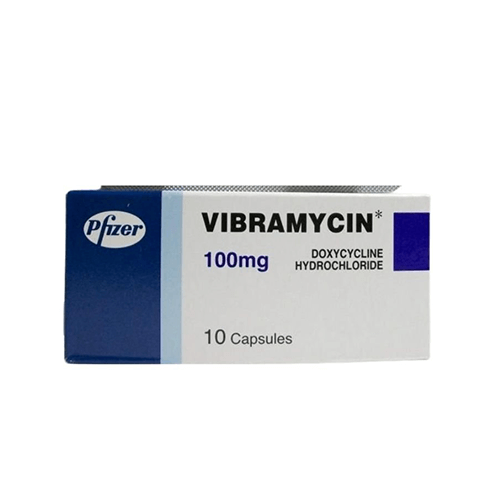Vibramycin 100Mg | 10Tab


Vibramycin 100Mg | 10Tab
Requires RxVibramycin 100Mg | 10Tab
Vibramycin contains doxycycline, an antibiotic from the tetracycline group, and is used to treat many infections caused by bacteria.
Indications
Doxycycline is used to treat the following diseases:
Acne, where doctors prescribe doxycycline to treat acne, as it reduces the oily secretions that affect the skin.
Infections caused by chlamydia.
An alternative to mefloquine for the prevention of malaria.
Syphilis treatment.
Neisseria gonorrhoeae.
Uncomplicated Listeria.
Treatment of Clostridium infections in patients allergic to penicillin.
Treating pneumonia.
Anthrax caused by Bacillus anthracis.
Treatment of infections caused by uncommon Gram-negative and Gram-positive susceptible organisms.
Lyme disease.
intestinal amoebae.
cholera.
Dental infections such as periodontitis.
Infections caused by vancomycin-resistant enterococci.
How to use
Do not lie down for half an hour after taking the medicine.
Doxycycline should be taken 1 hour before or 2 hours after taking antacids, calcium, iron, and magnesium antacids.
Doxycycline increases the skin's sensitivity to sunlight so you should avoid prolonged exposure to the sun and wear protective clothing, sunglasses, and use sunscreen.
Esophagitis can be avoided by giving capsules and tablets with plenty of fluids and keeping the patient in an upright position, as well as before going to sleep.
Surface discoloration of permanent teeth in adults, but it is not permanent discoloration that resolves with discontinuation of medication
Doxycycline and antacids
Doxycycline should not be concomitantly taken with antacids containing magnesium, calcium or aluminum salts, as they impair the absorption of doxycycline.
side effects
Diarrhea.
Light sensitivity and increased susceptibility to sunburn.
Transient retarding bone growth is mainly reversible, but tooth discoloration and lack of enamel formation are permanent.
Warnings and Precautions
In the event of any of the following health problems, it is recommended to inform the doctor or pharmacist, as some cases may require special precautions:
Liver disease.
This medicine may lead to liver toxicity.
Kidney disease.
Long-term use of the drug requires monitoring of the concentration of the drug in the body.

















 Contact Us
Contact Us


















